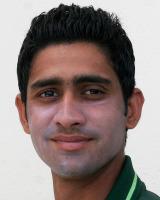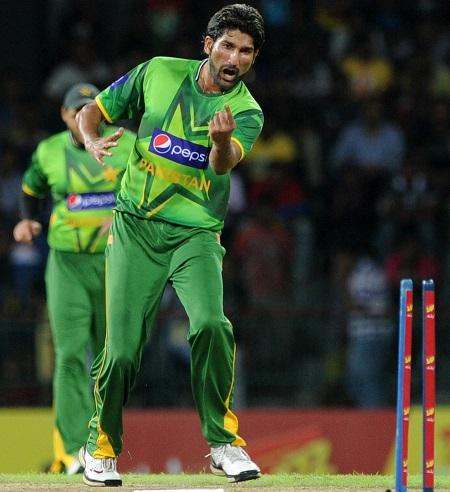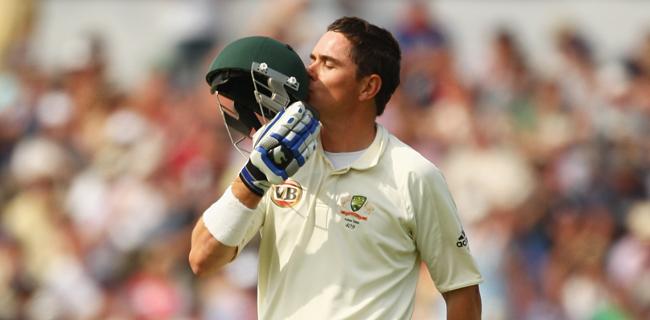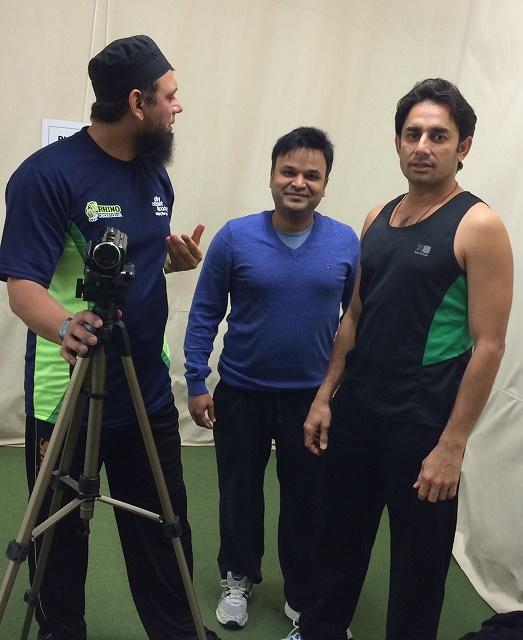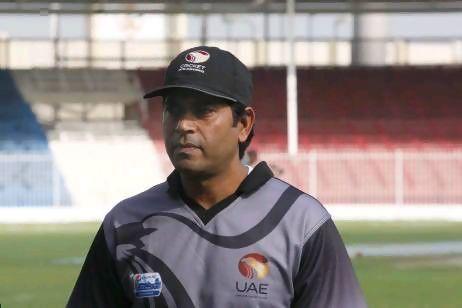It is a great pleasure to be speaking with David Dwyer, who had a very successful stint with the Pakistani team as fitness coach.
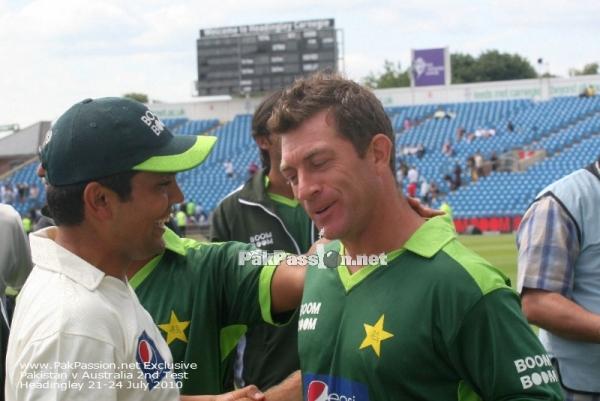
PakPassion.net: We'll start with some fitness-related questions in relation to the Pakistan team - which players were most dedicated towards fitness and training?
David Dwyer: (laughs) Might as well load the questions up early, eh? Look I wasn't the sort of person that really likes to single out individual players. I think that over the time, I'd like to say that over the three years that all of them were very dedicated to it in different ways because they had different needs. So there were guys like Kamran Akmal and Salman Butt, Asif, Hafeez and Umar Akmal who were all located in Lahore, who trained daily when we weren't travelling and touring. They were involved with domestic games. There were times when Shoaib Malik just showed a huge dedication to his ability. I mean he's already got enormous athletic ability. Shahid Afridi was someone who was constantly focused on his fitness and what he wanted to do. They are just some of the names, but I certainly don't want to single out any one player. I thought over the time that I had them, they improved dramatically, enormously. They got to really understand why we did and what we did and a few of them, since I have left, they been pretty self-sufficient to assist themselves and remain fit.
PakPassion.net: How difficult was it to come up with a fitness plan for each player in the team? Were they given fitness targets for the off-season, or would they have to start from scratch when they joined the team again?
David Dwyer: In some ways it was difficult because it was the first time that I have been involved with the Pakistan team, and so didn't know all of the players and their abilities and their targets previously, so we started afresh. We basically decided to come up with a plan based on what their weakness and strengths were. We had individual meetings with them and I gave them individual targets that were agreed upon by the players, myself, and the coach. We tested them throughout the course of the last few years to make sure that we were achieving these targets and they were improving. We'd then discuss where they were going right and wrong with their training, so it became quite specific. Bowlers were a lot different in relation to batsmen. The one thing that's difficult is that we have, here in Australia, what we call the 'training age'. People in Australia have access to a huge amount of facilities and resources in relation to that. In Pakistan, they don't necessarily have the facilities in relation to the number and quality of the gyms. There are some, and also those people who are good enough to be able to take them through it and talk them through it and help them with their training. So again it was something that we just had to try and cover as time went by. Over the course of time, I got to know what their injuries were, or niggles more than injuries, and which of them individually based on what we thought they needed.
PakPassion.net: As professional sportsmen, how seriously do Pakistani cricketers take their eating habits and the consequences they have on their levels of fitness?
David Dwyer: Look, that was probably the biggest challenge I had, was try to challenge them with their diets and it was something that was very difficult to change I must admit, as much as I tried! In a lot of cases it?s having access to those great foods on a regular basis. Some of them are lucky - when we go to places like the NCA in Lahore you know you do have access to these sorts of food, but even then we suffered a bit because I don't think that the cooks and the chefs really have an understanding of what is quality food and why we have it and what it?s providing for the player. In relation to that, we went to Fiji just recently and that was for the Rugby World Cup, preparing the players for the Rugby World Cup over three or four months. At the end of the three or four months, we were able to individually train them up and explain the whole reasons why. It was just one of the challenges that proved quite difficult unfortunately. Hopefully over time they will improve and get a better understanding.
PakPassion.net: There were rumours that you came up with plans for improving player?s fitness levels that was knocked by PCB? Is it true? If so, why was it knocked back?
David Dwyer: Yes I did, I came up with a number of plans. I came up with some things and options that I thought were worthwhile. Looking at trying to instil into their contracts details of fitness so that they had to pass two fitness tests a year and based on those targets. It?s a tough thing to try and incorporate completely because we are travelling anywhere up to 12 months a year and playing. So getting the time for the fitness test is not easy, but certainly not impossible if you've got the right staff and ability to be able to support the things you want to do. In relation to the other stuff, I guess it was a difficult time for a lot of people in the sense that we weren't playing at home, so you don't get the television broadcast and money as regularly as you would if you had series at home. So for whatever reason they just weren't able to do it and said they weren't able to do it at that particular time, which was frustrating because we were wanting to try and take these guys to new levels and new limits, improving what we do. Not being able to give players the example in what we need to do in improving the body and their physical shape, so that they are in the best shape possible to play the game that the whole Pakistan wants them to play and support, it just makes it a bit frustrating that's all.
PakPassion.net: Time and again we are seeing young cricketers come into the Pakistan side who are lacking in overall fitness. Why is that and why is it not being addressed?
David Dwyer: I guess I alluded to it a little earlier in that I mentioned what we called 'Long Term Athlete Development', so it is basically describing the abilities of a player from age 0 through to age 35-36. With the kids it's not part of their curriculum. For example, I've been working with a number of high schools casually over time and part of the curriculum is actually gym training and physical fitness. While I see something is involved. I just don't know whether or not schools in other areas are quite aware of it and the impact of it and what it can provide them. Sport to them, is probably more along the lines of two lessons and then also looking at just playing basic cricket or soccer. So from that perspective it makes it difficult to try and teach kids at a young age, aware of the impact and importance of physical fitness before they become a senior member of the Pakistan side. It is hard, it?s difficult. I guess it is awareness, an education thing. The quicker it becomes instilled into the curriculum at schools, the better the teams and athletes will be produced.
PakPassion.net: You have been away from the side for a bit but when you left, what do you think the team's fitness levels were, on a scale of one to ten?
David Dwyer: I'll be harsh on myself and say maybe a six or seven, only because there were a number of things that I wasn't able to do. It?s a balancing act, making sure these guys are fit, but you rarely get the time to do it. I mean, you are only carrying a squad of 15 generally, although I did manage over time to get them to carry a squad of 17 which was helpful especially for long tours. The schedules these days just make it bordering on impossible to really get the quality time and off-season as such to train these guys like that. Because of that, you really don't quite get to go and cover the things you want. So being harsh, I mean obviously I've got areas that I could have been a lot better in and paid more attention to and that was being able to get the time, which was a factor that made it quite difficult.
PakPassion.net: How much work if any is being done at domestic level on educating Pakistani cricketers on gym work, nutrition, etc.?
David Dwyer: It certainly is, there definitely is. I know that the NCA and the PCB were running courses for them and all the trainers in each of the domestic teams that were playing within in the domestic competition. But again it is a matter of being able to get access to the right facilities. Like a guy from Abbotabad rarely has the ability to get to these sorts of facilities. That's why I thought that it was extremely important that the PCB look at these five major training centres that they can set-up to give players the access to these facilities and that will improve them in so many different ways ? you are looking at less injuries, looking at better increased fitness levels in comparison to someone of their age that arrived in the team ten years ago or five years ago. All of these benefits are ongoing and flow through over time and that made it really important - that's why I thought those sorts of plans needed looking at really, by giving them a bit more importance and attention.
PakPassion.net: You are talking about fitness trainers in Pakistan. Are there any ones that impressed you?
David Dwyer: Look they were all super keen on it, which was the best part. They'd always ring and ask and send emails and I was more than happy to help out when I could. I guess as I said before, the most difficult part of their job was, number one was they didn't have access to facilities. Strength training is just such an integral part of what we do and it allows the body to cope with the rigours of a bowler to bowl at 160 km/hr at such a young age. Having said that too, the poor fellows, whether they got the support or not from the coaches as well was another huge thing that they really needed to get. Senior players in Pakistan have so much to say and if it doesn't suit them, well then they don't incorporate it. So it was a matter of getting all those things right and then you will have the right outcome for the domestic trainers.
PakPassion.net: In recent years, whether it?s down to luck or otherwise, we have seen that Pakistani cricketers and especially fast bowlers have not had as many injuries as they have in the past. Do you think that could be due to the changes you may have implemented in their training?
David Dwyer: Yes I'd like to think that it?s not luck and I'd like to think that it?s the hard work we've put in over the time. The fast bowlers that we had, most of them had what we call ?having quite big engines? so they had huge capacity to really work hard over a long period of time and that was great. With that we did a lot of strength work and a lot of flexibility, core work, we focused a lot on it. And because of that I'd like to think that the results come through and that's why players were: a) fit and b) able to cope with the rigours of increasing load of test cricket and cricket as a whole. So I kind of like to think that it wasn't necessarily just luck but a combination of factors with very good physio treatment, and medical treatment, very good strength and conditioning programs that we provided. And the attention to detail of things like running loads, bowling loads, training loads and all that encompass the fitness of the players. And that's why we paid attention to it. They are such a valuable resource and we can't lose these guys.
PakPassion.net: Pakistan's fielding has been notoriously poor; do you see a link between fielding and fitness with the players?
David Dwyer: Look there are small links, but to be perfectly honest I think the vast majority of that blame needs to be apportioned the facilities that are available. I mean the grounds are exceptionally hard. They really, really are. Also the quality of coaching. So whether or not there is quite the quality of emphasis that?s put on the fielding techniques. You'd be a tough man to want to try and teach a group of players how to slide across the floor when they are picking out rocks out of their legs. Because of the heat, the grounds are hard and dry. You go to places like England and Australia and Africa, where the ground is beautifully green and soft and really well looked after, and then you are going to get this in fielding performances. Then when you are teaching them they can learn the right techniques. So yeah look there is [a link], I mean if a player tires he's not going to bend down as quickly or as often, and not going to be able to get to the ball, and these are things we need to pay attention to. But a lot of the problems stem from the quality of the facilities they are helped to train on and the coaching techniques provided.
PakPassion.net: Onto a bit of a lighter note and your experiences with the Pakistani team, do you still follow the progress of the team, do you still keep in contact with any players?
David Dwyer: Oh yes. Mate, I was talking with two or three of them this morning on email.
PakPassion.net: You originally came with Henry, who is still very popular with the fans and players, what made you stay on after his untimely departure?
David Dwyer: Look the players certainly were the first and foremost thing in my mind. I guess there were some things that I think we didn't accomplish as a squad and as a group because I had only been here a short time, at the time they asked Geoff to move on. And I guess I was looking to continue to really challenge myself and that was an even bigger challenge and that was being on my own without necessarily someone from home whose relationship that I had. It was just more about challenging me, it was about the team as well, the players and achieving all the targets that we wanted. I don't think we had achieved them up to that point even though Geoff had gone after a short time. So it was that and making sure that I was under pressure in my career so that I could develop as a person in what it is that I do, and hopefully that will stem on into other areas of my career.
PakPassion.net: All the best with that. You've spoken very warmly about the Pakistani players and your contact with them, how did you actually find living and working in Pakistan? Did it change any perceptions that you had of Pakistan?
David Dwyer: Yes absolutely! Some of the warmest and friendliest people I have ever come across, and were very accepting of me. I made efforts to try and learn the language as much as I could. I accustomed. I certainly paid attention to everything they did. I certain didn't want to interfere with any of the cultural aspects of Pakistani life and in fact wanted to be a part of it as much as possible. I would just like to hope that with the right attitude it's such a wonderful place with such wonderful people. I look forward to my next opportunity to be able to go there and see the people. I certainly miss a lot of them. I miss a lot of the things about it. Some of the places I got to see, some of the food I got to eat, some of the wonderful people I got to meet. It was a wonderful experience and one I will treasure.
PakPassion.net: Did you get a chance to explore some of the sights, places and food of Pakistan while you were there?
David Dwyer: Yes absolutely! When you talk about some of the sights, we had a training camp up in Bhurban prior to the Champions Trophy and the T20 World Cup in the UK. It was quite extraordinary to be at that those heights - you are at the foot of the Himalaya mountains, and that's an extraordinary sight; You are talking about some of the highest mountains in the world. Some of the food! I remember going to a barbecue in Lahore. Looking at Eid and some of the food that comes out then. Some of the barbecues we had at the National Academy, it was quite extraordinary. Some of the restaurants down in the main streets of Lahore were beautiful. Some of the food is just extraordinary!
PakPassion.net: Would you like to share any memorable or funny anecdotes during your stint with the Pakistan team?
David Dwyer: Can you possibly go past any story that has got to do with Yasir Hameed, honestly, just used to be fun. See him come out with some of the silliest things you've ever heard, but also some of the funniest, funniest things. And he is another person who was wonderful and a nice guy whom I speak to occasionally over the internet (laughs). He's hilarious, he's such a good guy. Then Wahab Riaz always on the bus with Salman Butt. The jokes that they used to come out with often on the telephone and share. They were some of the highlights for sure.
PakPassion.net: That's nice to hear. What are some of the nicknames of the Pakistan team players? We hear Wahab Riaz is called Princess and Shoaib Akhtar Elvis - is there a story behind these names?
David Dwyer: (laughs) Wahab, we just tried to give a little bit of stick. I guess its a bit of an Australian attribute possibly as much as anywhere else but its certainly one I am used to at home, to give people a bit of stick to keep them honest and down to earth. Wahab has grown up in a home where he was afforded a lot of opportunities, and he's such a good player in his own right. He was one guy we give a little bit of treatment to, to keep him grounded and honest, and calling someone Princess meant they were well pampered and looked after. We just wanted to mess around with him (laughs), he was always fine with it. He's always got the new gadgets, the new phones - he's never missing a new gadget. Elvis, it was more along the lines that Elvis was one of the biggest rockstars of the music world and it just seemed to fit Shoaib Akhtar (laughs). I just thought it was funny. I mean between he and Shahid Afridi, two of the biggest names in World cricket let alone Pakistan at the time, and I was there. So there it is, Elvis was the leader in music, well he's the leader in fast bowling.
PakPassion.net: Moving onto your Rugby World Cup experience. How was it? Was it your first World Cup?
David Dwyer: That was my first Rugby World Cup. It was good - I got to learn a lot. The cultures in relation to sport are completely different. In essence, in rugby, the attention to detail is so huge and you are on the ball full-time all the time, especially in a contact sport. It was great I enjoyed it. It was just a little disappointing from a results perspective. You always want to go out and win but I guess in the grand scheme of things, we had set targets but we didn't achieve as many as we would have really liked to. From that aspect, you always take it a little personally, and you want the team to do well especially as you are involved. But it was an incredible experience and one I hope I get to have again.
PakPassion.net: We've spoken about Rugby - it is your specialist area. Would you ever consider going back to cricket?
David Dwyer: Absolutely yes. I have been looking and applying for cricket jobs as well as rugby ones. I don't particularly want to narrow myself down to one sport. I want to make sure I can tick the box for every particular sport and really make a difference in that way. Cricket is certainly something I like and enjoy and I would like to be a part of it again.
PakPassion.net: Well that brings us to the end of our interview. Once again many, many thanks for speaking with us. It's been an absolute pleasure and great hearing some of the stories and the experiences you had. It's always good to hear them from someone outside of Pakistan. We wish you all the best with whatever you plan to do in the future. Thank you very much again.
David Dwyer: No worries. I probably didn't start here as I'd want to. I'd prefer to have started with an 'Assalamu Alaikum' and ended with a 'Shukria' for all the Pakistan people for accepting me at the time and being so supportive. It's such an absolute honour to be considered a member of the Pakistan society. To be accepted as a foreigner, it's certainly not an easy thing and I was certainly grateful that every Pakistani smiled at me every time they said hello to me, they wished me the best of luck all the time and were willing to accept me as part of Pakistan.
